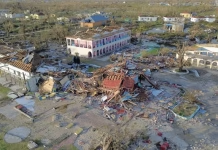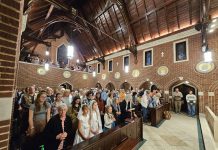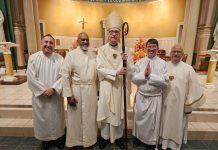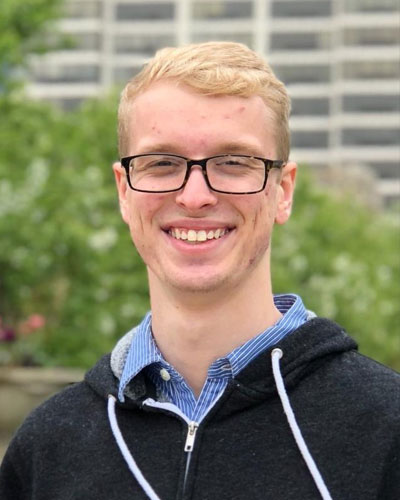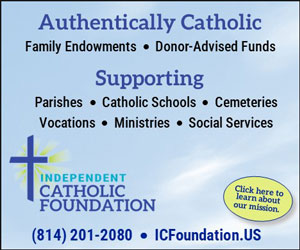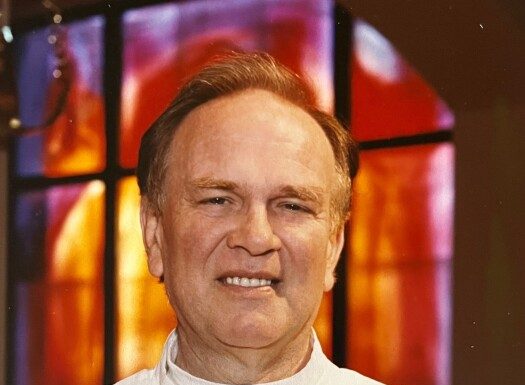Column by Justin Kirkland
Lent is a time of purgation and seriousness in order that we be united to Christ even in the darkest parts of the human person, but I’m sure that if anyone had told us at the start of Lent that we would be spending Holy Week at home, with no public Masses, and no ritual, we would have thought they were crazy. We all would have scoffed at the notion and gone on with our daily lives with whatever we had ‘given up’ and not eating meat on Fridays.
Instead, we have a new sense of what daily life means in a time of Covid-19 and quarantine. We are asked to work from home, not being able to go out as much, and might even have the worry of layoffs and how we will pay bills in the back of our minds. We have also been given the toughest task any Bishop can possibly give us, to be away from the food which is necessary to live, to be away from the physical love of God in the Sacraments. We should understand that these mandates are for us and our best interests, and adhere to them in simple and loving obedience. Our bishops and priests are being good fathers and desire their people to be safe and healthy, just as a good father should for their children. But what do we do in these times and what can we learn about where we are going?
A central teaching in Christianity is the understanding of community within the Body of Christ. The thought, as Saint Paul writes in 1 Corinthians 12, is that if one part is afflicted, the whole of the body is afflicted, and if one part of the body grows in holiness, the whole of the body grows in this holiness. We, however, have been conditioned in modern society to think in the I, “I think… I believe… I want…”, but these times aren’t for the selfishness of “I” statements. We are a part of the wider community which is the Church, and we are united mystically to Her whether we are present and cognizant of it or not. Though public masses might be cancelled, private masses are still being said. We may not be physically present, but spiritually, our priests are bringing us with them to the altar, as they do at every Mass, offering the Body and Blood of Christ to the Father on our behalf so that we may be holy and grow as the Mystical Body of Christ. Just as those who follow Judaism believe during the Sabbath they are united to their loved ones and the people traveling in the desert, we believe that at every Mass, we are united together as one body with the angels and saints, praising and adoring together the ever present Christ on the alter. Now without the physical closeness, we should push to pursue this understanding that we are not alone, we have not been abandoned, but instead are a part of a Church that continues to listen and unite our sufferings with Christ on the Cross. Even in our own sin and the darkness of our times, as She has done since Her founding and will continue to do until Christ comes again, our Church continues to complete Her mission of spreading the Good News of Christ, caring for the vulnerable, and offering salvation to souls throughout the world.
Another point which we can meditate on is that almost all of us have never been in a situation in which we have not been able to receive the Sacraments for an extended period of time. We have had them so readily available, they can become as ordinary as any other action. Just as we take an aspirin, we take the Eucharist, or hear the words Absolution. Due to this, many of us, including myself, have in a sense, taken advantage of the gifts which we have been given. Instead of desiring to be on fire, we have been comfortable and lukewarm, letting others take actions instead of ourselves. Now, as we live a more secluded life, we have an opportunity to flip that switch. We have more time to slow down, to start praying more and embrace the journey of the spiritual life, and as we read from the Life of Saint Macrina, to make our homes into mini monasteries just as she did. In this spiritual growth and the putting on of new habits of virtue, we can stop looking at just the gifts, but instead fall in love with the Giver. Instead of being hung up on the quickness and pettiness of life, we can focus back on a God who desires our hearts to be His alone, start yearning for Him, and live our faith by action and not just by word.
We all know that things are different than they were two months ago, but hope and faith continue to prevail. Our priests and bishops have been innovative by broadcasting Masses, Stations of the Cross, and Rosaries to show us that spiritually, we are united together in prayer. Small groups have sprung up throughout our diocese and the world to pray and be together over Skype and Zoom, coming together in new ways to give of themselves to one another and to the Church. These times are hard, but it is a time of great love. We are being called unlike any other time to embrace the Cross as Christ embraces our darkness and to desire Him who desires us more than before. Allowing God to transform us, letting our sadness and anger be consumed by the awe inspiring love of our Savior, we can come out of this a more holy and loving people spreading the joy of Christ and His Church. Just as Our Lady of Good Success predicted, that even through our recent struggles, this “will be the happy beginning of the complete restoration” of the Church. This will pass, and our reunion with Christ in the Sacraments will be better than we can imagine.
Justin Kirkland has a Bachelor’s degree in Theology from Franciscan University of Steubenville and is pursuing a Master’s degree in Theology. He is employed in the Diocese of Altoona-Johnstown Offices of Communications, Human Resources, and Youth Protection.


